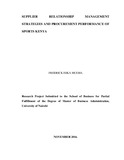| dc.description.abstract | Supplier relationship management is gaining momentum globally due to immense competition in the corporate world as well as the sports industry. Supplier Relationship Management (SRM) is the development and maintenance of strategic relationships with vital suppliers and encourages enterprises into thinking critically about the supply chain and supply chain transparency. The study aimed to define the supplier relationship management strategies commonly used by Sports Kenya and to establish the relationship between supplier relationship management strategies and procurement performance of Sports Kenya.
Theories underpinning this study were Social Exchange Theory, Resource Dependency Theory and Theory of Dual Economies. Descriptive survey research design was used with both quantitative and qualitative approaches to determine the suppliers’ relationship management strategies and procurement performance of sports Kenya. The target populations of this study were 25 officers of Sports Kenya procurement department and its unit. Data collection was done through use of questionnaires and then analyzed using statistical package SPSS and presented in tables and figures. The study used regression analysis to estimate the causal relationships between factors under study. The study established that Sports Kenya has put in place a comprehensive approach to manage its suppliers of goods and services. Further, this also established that supplier segmentation strategy contributes most to the procurement performance followed by supplier performance management strategy. Sports Kenya has categorized suppliers based on well-defined classes. Sports Kenya has internal control procedures for managing the various classes of suppliers. Supplier relationship management governance strategy had the highest Standard deviation across all the attributes measured; this implied that this strategy, is not consistently used in Sports Kenya. Sports Kenya collects information about the quality standards, pricing and contract compliance. Sports Kenya views knowledge management as part of supplier development. At 5% level of significance and 95% level of confidence, supplier segmentation strategy, supplier performance management strategy, supplier relationship management governance strategy and supplier development strategy were all significant in procurement performance. The study recommends that Sports Kenya need to train their staff on the implementation of these SRM strategies and adopt early supplier involvement in supply chain management for them to obtain maximum benefits. The study also recommends intensified implementation of supplier governance strategy and supplier development strategy since they had significant relationship with procurement performance. | en_US |



